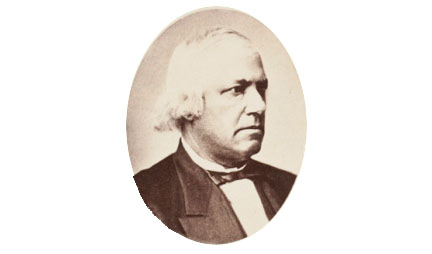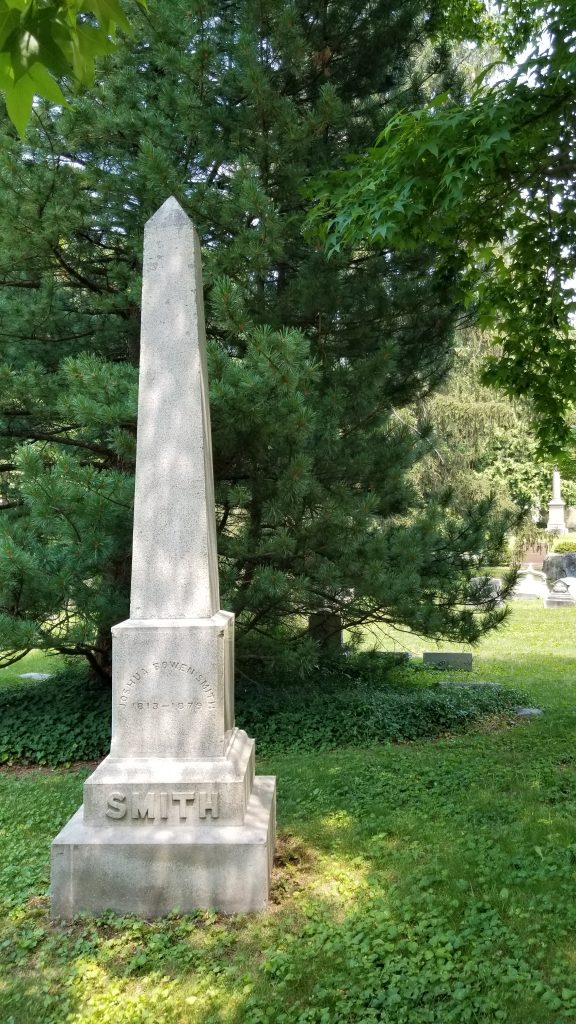
Joshua Bowen Smith (1813-1879)
Caterer & Underground Railroad Conductor
Joshua Bowen Smith was born in Coatesville, Pennsylvania, to an English father and a mother who was possibly of Native American and African heritage. Smith received a public school education in Pennsylvania and lived in a Quaker household. He came to Boston in 1836, and worked for a period as a head waiter at the Mount Washington House, a hotel in South Boston. He found his calling as a successful caterer, one of the few occupations open to Blacks at the time.
In addition to Harvard College, Smith’s clientele included well-known abolitionists, including the merchant Robert Gould Shaw. At Shaw’s home, Smith was introduced to other abolitionists such as William Lloyd Garrison, George Luther Stearns, and Theodore Parker. Smith played an instrumental role in raising funds for the memorial to Shaw’s grandson, Colonel Robert Gould Shaw, erected across from the State House in Boston. The memorial, created by the noted American sculptor Augustus Saint-Gaudens, depicts Colonel Shaw with members of the 54th Massachusetts Regiment of African American soldiers.
Known as the “prince of caterers,” Smith catered several memorable occasions, including the 12th Anniversary of The Liberator newspaper, and the commemoration of the Emancipation Proclamation. In defiance of the 1850 Fugitive Slave Act, which prohibited assistance to run-away slaves, Smith gave refuge to freedom seekers by employing them in his business. He gained a reputation as one of the prominent Underground Railroad “conductors.” Smith also represented Cambridge in the state legislature from 1873 to 1874, and served on the chair of the Federal Relations Committee.
Smith lived on Beacon Hill not far from Charles Sumner, the abolitionist, lawyer, and senator. “Sumner grew up in the heart of the Black community on Beacon Hill. His father was the liberal-minded sheriff of Suffolk County,” the authors Stephen and Paul Kendrick write. “As a child, he watched his father’s friendly relations with and customary bow to people of all races, and he was raised with an awareness of the plight of free Blacks that many, including passionate abolitionists, did not have.”[1] Even though Smith moved away from Beacon Hill, the two men developed a deep friendship. Smith later served as a valued advisor and sounding board to Sumner as he worked on the bill that became the Civil Rights Act of 1875. A renowned art collector, Sumner bequeathed one of his prized paintings, The Miracle of the Slave, to his friend and colleague Smith.

In 1852 Smith moved to 79 Norfolk Street in Cambridgeport. The integration of Cambridge schools made this area a welcome community for African Americans, many who had previously lived on Beacon Hill. Joshua Bowen Smith died on July 5, 1879. He was buried at Mount Auburn in his family lot, commemorated with an impressive obelisk, in front of a large pine tree, not far from the gravesite of his friend, Charles Sumner. Following his death, his grave became a site of pilgrimage for visitors on Decoration Day, what is now known as Memorial Day.
Joshua Bowen Smith is buried in Lot 1562 on Cypress Avenue.
Footnotes:
[1] Stephen Kendrick and Paul Kendrick, Sarah’s Long Walk: The Free Blacks of Boston and How Their Struggle for Equality Changed America. Boston: Beacon Press, 2004, pp. 142-143.
Top Image:
Photograph of Joshua Bowen Smith, cropped from a larger photo showing ten Massachusetts state representatives, 1874.

